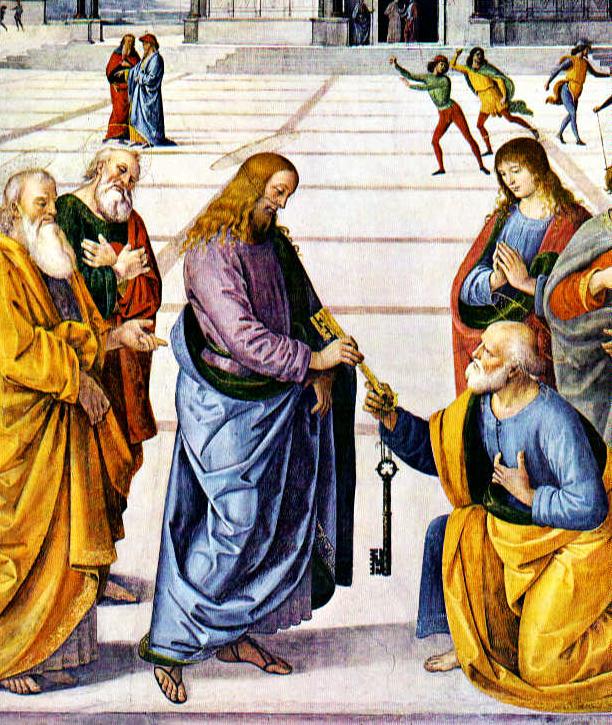The Catholic doctrine of the papacy is biblically based, and is derived from the evident primacy of St. Peter among the apostles. Like all Christian doctrines, it has undergone development through the centuries, but it hasn’t departed from the essential components already existing in the leadership and prerogatives of St. Peter. These were given to him by our Lord Jesus Christ, acknowledged by his contemporaries, and accepted by the early Church. The biblical Petrine data is quite strong and convincing, by virtue of its cumulative weight, especially for those who are not hostile to the notion of the papacy from the outset. This is especially made clear with the assistance of biblical commentaries. The evidence of Holy Scripture (RSV) follows:
1. Matthew 16:18: “And I tell you, you are Peter, and on this rock I will build my church; and the powers of death shall not prevail against it.”
The rock (Greek, petra) referred to here is St. Peter himself, not his faith or Jesus Christ. Christ appears here not as the foundation, but as the architect who “builds.” The Church is built, not on confessions, but on confessors – living men (see, e.g., 1 Pet 2:5). Today, the overwhelming consensus of the great majority of all biblical scholars and commentators is in favor of the traditional Catholic understanding. Here St. Peter is spoken of as the foundation-stone of the Church, making him head and superior of the family of God (i.e., the seed of the doctrine of the papacy). Moreover, Rock embodies a metaphor applied to him by Christ in a sense analogous to the suffering and despised Messiah (1 Pet 2:4-8; cf. Mt 21:42). Without a solid foundation a house falls. St. Peter is the foundation, but not founder of the Church, administrator, but not Lord of the Church. The Good Shepherd (John 10:11) gives us other shepherds as well (Eph 4:11).
The papacy is derived from Peter's primacy among the apostles. It's essential components are revealed in the apostolic leadership of St. Peter.

www.patheos.com
I'm afraid I have to disagree that Peter is the rock and not Jesus/Christ. The following NT verses surely support the view that Jesus is the rock that the church is built on.
Matthew 7:24 "Everyone therefore who hears these words of
mine, and does them, I will liken him to a wise man, who built his house on a rock.
7:25 The rain came down, the floods came, and the winds blew, and beat on that house; and it didn't fall, for it was founded on the rock.
Matthew 16:18 I also tell you that you are Peter, (Peter's name, Petros in Greek, Latin Petrus, is the word for a specific rock or stone.) and on this rock (Greek, petra, Latin petram, a rock mass or bedrock.) I will build my assembly, ....
Matthew 21:42 'The stone which the builders rejected, the same was made the head of the corner. This was from the Lord. It is marvelous in our eyes?' (Psalm 118:22-23) ....
21:44 He who falls on this stone will be broken to pieces, but on whoever it will fall, it will scatter him as dust."
Mark 12:10 Haven't you even read this Scripture: 'The stone which the builders rejected, the same was made the head of the corner.
Luke 6:47 Everyone who comes to
me, and hears
my words, and does them, I will show you who he is like.
6:48 He is like a man building a house, who dug and went deep, and laid a foundation on the rock. When a flood arose, the stream broke against that house, and could not shake it, because it was founded on the rock.
Luke 20:17 But he looked at them, and said, "Then what is this that is written, 'The stone which the builders rejected, the same was made the chief cornerstone?' (Psalm 118:22)
020:018 Everyone who falls on that stone will be broken to pieces, but it will crush whomever it falls on to dust."
Acts 4:11
He (Jesus) is 'the stone which was regarded as worthless by you, the builders, which has become the head of the corner.' (Psalm 118:22)
Romans 9:32 ... They stumbled over the stumbling stone;
9:33 even as it is written, "Behold, I lay in Zion a stumbling stone and a rock of offense; and no one who believes in him will be disappointed." (Isaiah 8:14; 28:16)
1 Corinthians 10:4 and all drank the same spiritual drink. For they drank of a spiritual rock that followed them,
and the rock was Christ.
Ephesians 2:20 being built on the foundation of the apostles and prophets,
Christ Jesus himself being the chief cornerstone; ....
1 Peter 2:4 coming to
him, a living stone, rejected indeed by men, but chosen by God, precious.
2:5 You also, as living stones, are built up as a spiritual house, to be a holy priesthood, to offer up spiritual sacrifices, acceptable to God through Jesus Christ.
2:6 Because it is contained in Scripture, "Behold, I lay in Zion a chief cornerstone, chosen, and precious: He who believes in him will not be disappointed." (Isaiah 28:16)
2:7 For you who believe therefore is the honor, but for those who are disobedient, "The stone which the builders rejected, has become the chief cornerstone," (Psalm 118:22)
2:8 and, "a stone of stumbling, and a rock of offense." (Isaiah 8:14)
This last one also says in Zion not in Rome.




